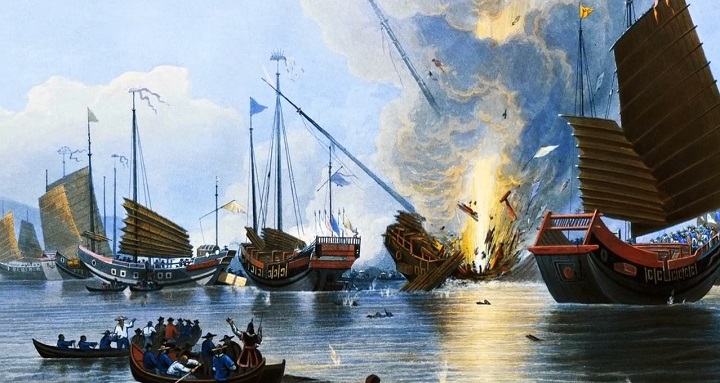
In 1914, on the eve of World War I, Germany was the wealthiest country in Europe. It had the best industries, science, literature, and philosophy. It had the finest education system, a superlative pension system, and the largest social democratic party in the world. It lost everything because it got global politics wrong.
In 1840, on the eve of the First Opium War, Qing China was the richest country in the world. It represented between one-third and half of global GDP. It had over 70% of all the world’s silver, then the reserve currency of international trade. It had a huge export surplus, and its tea was necessary to make the foul water of industrial cities all over the planet drinkable. Yet, it got international politics wrong and lost everything.
In 1860, on the eve of Garibaldi’s liberation of southern Italy, the Kingdom of Naples was by far the richest, most advanced, most industrial state of the peninsula. Its next competitor, the Savoy dynasty, wasn’t half as vast or as powerful. Yet again, this was to no avail because Naples had gotten international politics wrong, and it disappeared from the map.
Then two questions for Beijing now: Is China as strong as Germany in 1914, the Qing dynasty in 1840, or Naples in 1860? Plus, does China get international politics right?
It may be “yes,” however, in my very humble opinion, it is “no;” but, of course, this may be all wrong.
Very modestly also, it is not president Xi Jinping’s fault, as the standard narrative goes. The mistakes started after the financial crisis in 2008, when China tought the United States was falling apart. Still, it had roots in 2004, when China was surprised and didn’t budge when America started having difficulties in Iraq. In those years, China grew complacent and arrogant with its two crucial neighbors, Japan and India; it mothballed planned political reforms at home and in Hong Kong.
China then should have assisted the US as best as it could in Iraq and Central Asia to cement the new partnership started in the wake of 9/11. It should have sped along with democratic elections in Hong Kong and structured political changes at home. Also, it should have kept Japan and India on its side at any cost.
Beijing didn’t do any of that, while it was told so, and the result is China’s situation today. Is it good? One wonders.
Certainly, in Europe and America, thanks to the discovery of effective US vaccines, the Covid epidemic is waning, and prospects are that in 2022 it could be mostly over. A booming economic recovery is underway, and it could gain further traction next year.
The same might not be true in China, which contained the spread of the epidemic due to draconian social measures and still doesn’t have a very effective vaccine. The draconian measures were very effective at the beginning of the epidemic; now that the whole world is reopening again, they are an issue.
What can China do now, then?
The action most consistent with its system and the internal balance of power is “nothing,” a modern-day wuwei 无为, or “inaction.” It would mean: Close itself off and strengthen internal cohesion to avoid coups or rebellions. Therefore, draconian anti-epidemic measures are also helpful to keep external political pollution out, wait for the US to fall apart and for China’s rivals to come begging on their knees for mercy.
It may work, but it may also fail miserably.
Closing itself is, in fact, impossible. China needs its foreign trade to keep its economy going; closing down hits that. Also, what can China do when the claimed territories of Taiwan or the South China Sea are politically taken out? Will it get into a war that it would undoubtedly lose politically, besides any military result?
What will it do if India tries to push Chinese troops back in the Himalayas? Start a war that again it will undoubtedly lose politically? War will bring about an economic blockade that would hit the sprawling middle class, solid supporters of Mr. Xi’s rule and beneficiaries of forty years of reforms and opening up.
China, in these instances, could choose to step back, and give up territories for peace and domestic well-being. But, after years of pent-up nationalist propaganda, it won’t be easy to give up land and say to its middle class, we have to give in to foreign pressure once more.
China is caught in a vise and would need a new set of ideas to deal with it. Does it have them? Without them, Beijing could be worse off than 1914’s Germany or 1840’s Qing dynasty. Or the analysis could be completely wrong, then it’s all good for China.
And as China is preparing for its third Lunar New Year during the pandemic—while other countries might well be out of it—it may be worth remembering that historically conflicts start at the end of pandemics, not during them.






Francesco is he a real catholic?
How could China have supported the wanton US aggression against Iraq in 2003, based on obvious lies? It was well known that Iraq had never tested a nuclear weapon, hadn’t a competent air force and had never tested a missile with a reach greater than 600 km and that liquid fueled. And the other two WMD methods, chemical and biological, are rarely used even by US that has researched them much more thoroughly, in Korea and Vietnam. And what would have been the advantage to China of helping US bring the Central Asian countries under its control? That might well have caused US to continue supporting its corrupt puppet regime in Kabul even longer – to the detriment of that country and its neighbors.
A country has a duty to protect itself from aggression but sometimes that is difficult. India occupied the second most holy place in Tibet, Tawang, in 1951 and by 1962 its forces were North of the McMahon line that was proposed as the border by UK and rejected by China in 1913. After driving India out of Tibet in that year it retreated to a defencible line. India has refused to negotiate a border treaty with China ever since waiting for the time it would be military stronger than China. As a result of the land borders of China only those with India and Bhutan have not been determined by a treaty, India having reserved the diplomatic relations of Bhutan to itself – but Bhutan has now opened relations with China not many days ago. A retired Indian general said last year that Indian forces violate the line of Actual Control five times as often as Chinese forces. India is still the aggressor despite being the lesser power.
In 1979 China negotiated the removal of US forces from its territory Taiwan. A return of those forces to the island would be a clear case of aggression and China is now militarily strong enough to react.
If the Taiwan regime were to declare independence or do something similarly foolish China as the sovereign power has the authority recognized by nearly all countries in the world to close the ports and airports of the island and negotiate a solution. There is no need for an invasion.
As for political reform: “Beijing didn’t do any of that, while it was told so, …”. So it refused to become a satellite of US. It hadn’t forgotten the Plaza accord which enabled US to cut the legs of Japan’s economy by the knees. As for US’s “booming” economy, it is no such thing. It is fuctioning and “growing” by Treasury and Fed creating gigantic amounts of dollars out of thin air and in effect robbing other countries by its use of the dollar.
As for US politics, the power lies not with the electorate but with the sponsors of the members of Congress. As Gore Vidal said US has only one party, the American Capitalist Party, with a Republican and a Democratic wing. With democracy it has only the slightest connection. Is that a useful example? China prefers a parliament that has one very large party but also representatives from eight other parties.
The examples at the opening of this article are of course well known to China. It knows that the only serious threat to peace is US. That’s why it is modernizing its armed forces and even building aircraft carriers to deter US aggression. China is bound to win if it can avoid war having already a larger economy and in may fields more advanced research and development capabilities.
Another laughable article from Sicci.
The West controlling Covid from its wonder “vaccine”? Wasn’t it just a few days ago that a NEW variant based off of the Delta variant just appear in UK? The funny part is if the West didn’t allow Covid to metastasize within its borders, Covid would have been likely been pretty much licked within the first several months of 2020. By then there would have been FAR fewer mutations, and vaccines that would have come out later would have been FAR more effective.
Secondly, Sicci AGAIN shows why he should not be called a sinologist. A sinologist who literally translates wuwei as in-action or nothing is a POOR sinologist indeed. Only layman translates it as such and therefore have trouble understanding even the basics of Chinese Daoism, which therefore comes off as nonsensical. Wu-wei translates more into no unnatural actions. You would think Sicci would understand that basic concept, perhaps he should go back to reviewing classic Chinese philosophy, or some plato.stanford.edu articles again. Perhaps the US could learn a thing or two about wuwei. Would have served them well in the Middle East.
Just classic Francesco, doling out worthless references to esoteric Chinese verbiage both to boost his “Sinologist” credentials with an English-language audience who doesn’t know any better, and to keep up his broken-record rationalization for why China should bend to American hegemony. Framing “wuwei” this dishonestly of course comes naturally to someone who actually believes that unilateral American hegemony is the “natural order of things”.